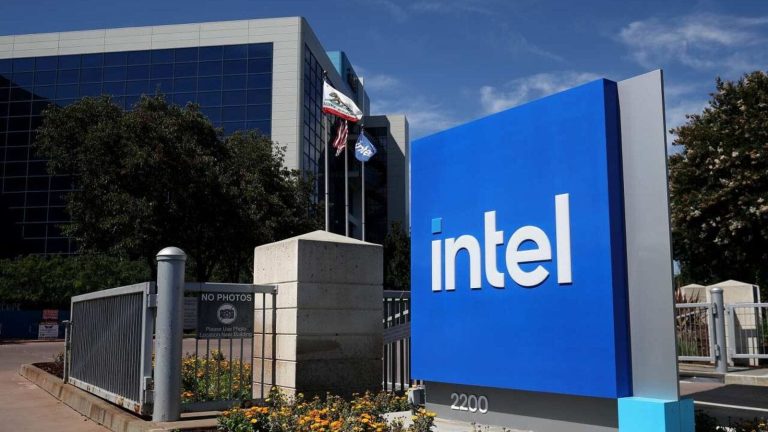Intel stock has been beaten so badly in recent years, it has become somewhat insulated from the sharp market downturn in the wake of President Donald Trump’s evolving trade and tariff strategy. During this period, Intel has appointed a new top executive, and in the next month will have a board more focused on management experience in semiconductors.
Under former CEO Pat Gelsinger, whose tenure ran nearly four years through the end of November 2024, Intel stock dove 55%. At the same time, rival chip maker Nvidia had been logging triple-digit annual percentage gains. Apart from the relative underperformance, maybe more humiliating for Intel was that Nvidia replaced it in the Dow Jones Industrial Average in late 2024.
Now Intel investors are seeing some sunshine in the bleakest days for the market. In fact, shares are down less than 2% for the year to date, which doesn’t sound amazing, until you consider that Nvidia stock has dropped 17%, and the S&P 500 is down 9%. It seems that anyone who had planned to sell their Intel stock for the most part already had.
And a high-profile Intel stock buyer recently picked up a large block of shares: New CEO Lip-Bu Tan was obligated to buy $25 million of shares early in his tenure, and he met that obligation in early March. Gelsinger had made it a habit to buy Intel stock dips, but investors may have been more impressed with Tan’s right-off-the-bat stock buy. In fact, because Tan purchased stock directly from Intel, and not from the open market, he is paying Intel more than the company is paying him in the near term.
When Gelsinger resigned Dec. 1, “restoring investor confidence” was one of the main goals laid out by Frank Yeary, Intel’s independent chair, who became interim executive chair during the transition period while the company was seeking a new CEO.
Four days after Gelsinger’s resignation, Yeary announced in a news release two immediate additions to the Intel board: Eric Meurice, former president, CEO and chairman of chipmaking-equipment firm ASML Holding, and Steve Sanghi, chairman and interim CEO of Microchip Technology. Yeary lauded them as “successful CEOs with proven track records of creating shareholder value.” With Tan rejoining Intel’s board—he had stepped down in August 2024—that swelled Intel’s board to 14 directors.
Yeary, managing member of private investment firm Darwin Capital Advisors LLC, and an Intel director since 2009, didn’t plan on keeping an expanded board. In late March, Intel disclosed in a regulatory filing that Omar Ishrak, Tsu-Jae King Liu, and Risa Lavizzo-Mourey would retire from the board, and not seek reelection at the annual meeting on May 6. Yeary praised the three in the filing as “accomplished leaders and long-standing board members who brought deep experience and expertise into the boardroom.”
But none of three departing directors have top executive experience in semiconductors. Ishrak, Yeary’s predecessor as Intel chair, was chairman and CEO of medical-tech firm Medtronic when he joined Intel’s board in 2017. Liu, the Dean and Roy W. Carlson Professor of Engineering in the College of Engineering at the University of California, Berkeley, joined Intel’s board in 2016; her experience is rooted in academia, research, and engineering. Lavizzo-Mourey, who became an Intel director in 2018, is an expert in health policy and geriatric medicine, and is a former president and CEO of the philanthropic organization Robert Wood Johnson Foundation.
“The Board prioritizes regular refreshment to ensure it has the necessary skills and experience to oversee our business and create long-term shareholder value,” Intel wrote in an emailed statement. “Eric and Steve are highly respected leaders in the semiconductor industry whose deep technical and executive experience make them great additions to the Intel board. We are grateful for the contributions of Omar, Risa, and Tsu-Jae during their years of service.”
Ishrak, Liu, and Lavizzo-Mourey had all joined Intel’s board when chaired by Andy D. Bryant, a former company executive who left Intel’s board himself in May 2020, more than half a year before Gelsinger’s tenure as CEO began.
The Wall Street Journal recently noted that Tan doesn’t have much time to effect change, and turn investor sentiment. He has at least some weeks after the May meeting, which will see a changing of the guard at the board. Intel could announce major strategic changes shortly after.
Inside Scoop is a regular Barron’s feature covering stock transactions by corporate executives and board members—so-called insiders—as well as large shareholders, politicians, and other prominent figures. Due to their insider status, these investors are required to disclose stock trades with the Securities and Exchange Commission or other regulatory groups.
Write to Ed Lin at ed.lin@barrons.com



